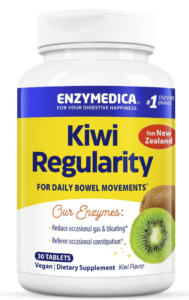Disclaimer: This post is for informational purposes only and does not constitute medical advice. Always consult your healthcare provider before starting new supplements or treatments. This website contains affiliate links, including links to products on Amazon.com. As an Amazon Associate, I may earn a small commission at no additional cost to you from qualifying purchases. I only recommend products that I personally believe in or have researched thoroughly.
Discover how kiwifruit, peppermint oil and digestive enzymes work together to relieve bloating and support healthy digestion—backed by science for your gut health.
Feeling Bloated? Read below to learn how to relieve bloating with natural remedies
Bloating isn’t just uncomfortable—it’s frustrating, unpredictable, and sometimes even painful. Whether it’s after eating a heavy meal, certain trigger foods, or due to IBS or food sensitivities, many people are turning to natural remedies for bloating that actually work. Here’s some good news from the world of gut health: peppermint oil, digestive enzymes, and kiwifruit may offer real relief.
Let’s break down why these natural remedies are becoming go-to tools for de-bloating.
1. Peppermint Oil: A Natural Muscle Relaxer for Your Gut
Another notable player in the fight against bloating? Peppermint oil. It’s been used for centuries to relieve digestive discomfort—and modern science backs it up.
How peppermint oil helps:
- Relaxes the smooth muscles of your intestines
- Reduces cramping, bloating, and trapped gas
- Supports better digestion by calming spasms in the GI tract
- Especially helpful for those with IBS-related bloating or pain
In clinical studies, peppermint oil has been shown to significantly reduce bloating, abdominal pain, and gas—often within hours.
Unlike standard peppermint oil capsules, IBgard uses ultra-purified peppermint oil in a patented delivery system that bypasses the stomach and releases directly in the intestines—where you actually need it.
IBgard is great for:
- IBS sufferers
- Stress-related digestive flare-ups
- Bloating that comes with cramping or nausea
Many users take it 30–90 minutes before meals to reduce symptoms proactively.
2. Digestive Enzymes: Back-Up for your Gut
Sometimes your body just doesn’t make enough digestive enzymes—especially if you’re stressed, aging, or eating a big, complex meal.
If your gut struggles to break down food efficiently, it can lead to gas buildup, bloating, and discomfort. That’s where digestive enzyme supplements come in.
For example, lactose intolerance is very common, the inability to break down lactose (found in dairy products) due to low levels of the digestive enzyme lactase, so then you may develop bloating, gas, abdominal discomfort and change in bowel movements. By supplementing with enzymes, you may help reduce those symptoms. Thankfully, there are great products out there that help exactly with that!
Digestive enzyme supplements usually contain:
- Protease (breaks down protein)
- Lipase (breaks down fat)
- Amylase (breaks down carbs)
- Sometimes lactase (for dairy) or cellulase (for plant fibers)
By giving your body extra support, these enzymes can reduce the workload on your stomach and pancreas, helping food pass through faster—and minimizing bloating, gas, and that heavy feeling.
Gut Gossip’s Recommendations for Best Digestive Enzymes for Bloating Relief:
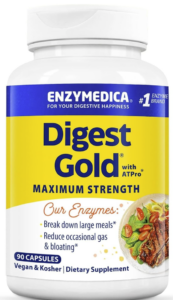
- Digest Gold– Broad-spectrum enzyme blend with protease, lipase, and more for complete digestive support.
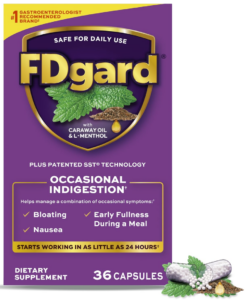
- FDgard – Great for IBS-related symptoms; includes peppermint oil and mucosal protective ingredients.
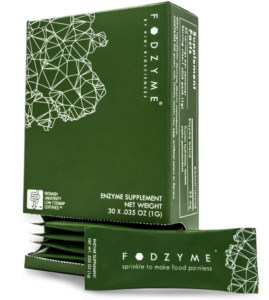
- FODZYME – Specifically breaks down FODMAPs (like lactose, fructans) that commonly cause bloating.
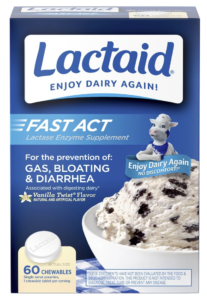
- Lactaid – Specifically helps to breakdown lactose in dairy products, meant to be taken with the first bite
Add one of these to meals that usually cause discomfort—think pasta, beans, veggies, or dairy—and you may feel lighter within minutes.
3. Kiwifruit: The Small Fruit with Big Digestive Power
Kiwifruit isn’t just high in fiber—it also contains a natural enzyme called actinidin, which supports the breakdown of proteins in your digestive tract.
Here’s what makes it special:
- Actinidin helps digest protein faster, especially from red meat and dairy
- Reduces bloating and discomfort
- Kiwifruit promotes gastric motility with faster digestion and gastric emptying
- High in soluble and insoluble fiber, which supports bowel regularity
- Acts as a natural prebiotic, feeding good gut bacteria
Clinical studies show that kiwifruit may reduce symptoms like bloating, abdominal discomfort, and constipation—especially in people with IBS or slow transit times.
Tip: Try 1–2 kiwis in the morning or before meals to support digestion.
Gut Gossip’s Top Pick:
4. Combine Kiwifruit and Digestive Enzymes — Why It Works
Think of kiwifruit as your natural, whole-food enzyme boost, while a supplement offers a more targeted, concentrated backup.
Using both kiwifruit and digestive enzymes gives your gut dual support:
- Kiwifruit works naturally and gradually to improve motility and fiber balance
- Enzymes provide fast-acting support for tough-to-digest foods
- Both reduce fermentation and gas buildup—a key cause of bloating
Bonus: Other Natural Ways to Relieve Bloating
- Drink warm lemon water in the morning
- Eat slowly and chew thoroughly
- Avoid carbonated drinks and excessive gum chewing
- Track trigger foods and eliminate if needed
Final Thoughts
Bloating doesn’t have to be your “normal.” By combining natural foods like kiwifruit with targeted digestive enzyme support and adding in peppermint oil, you give your gut the help it needs to break down food properly and feel lighter every day.
Shop Our Favorites:
- IBGard – Soothing Peppermint Oil for IBS and Bloating
- Digest Gold – Powerful Enzyme Blend for All Meals
- FDgard – IBS Symptom Support You Can Feel
- FODZYME – Beat Bloat from FODMAPs Fast
- Lactaid– Beat Bloat from FODMAPs Fast
- Enzymedica Kiwi Regularity – Relieves occasional constipation gas and bloating


